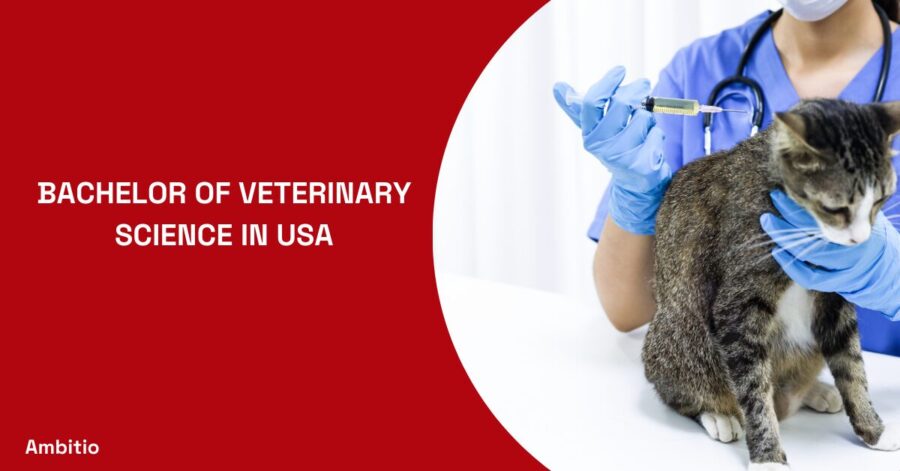14 December 2024
5 minutes read
Charting the Course for a Bachelor of Veterinary Science in the USA

Embarking on a Bachelor of Veterinary Science degree is a journey toward a fulfilling career that combines a love for science and a passion for animal care. In the USA, universities offer comprehensive courses that provide the scientific foundation and practical experience needed to advance to a Doctor of Veterinary Medicine program. This blog explores the essentials of the Bachelor of Veterinary Science, from course details to admissions and beyond.
The Bachelor of Veterinary Science: A Comprehensive Overview
The Anatomy of a Veterinary Undergraduate Course
The Bachelor of Veterinary Science is a specialized undergraduate course tailored to instill in students the foundational knowledge required in veterinary medicine.
This degree incorporates various sciences such as biochemistry, anatomy, physiology, microbiology, and animal nutrition, providing a holistic understanding of animal health and disease.
The Scientific Backbone
Over four years, students immerse themselves in biological and life sciences, gaining insight into the complex systems that govern animal bodies. Courses often begin with general biology, chemistry, and physics before moving into more specialized topics such as animal anatomy, which involves a detailed study of the structure of various animal species.
From Classroom to Clinic
Aside from theoretical knowledge, universities emphasize practical skills. Many programs include lab work, dissections, and clinical rotations, giving students hands-on experience. Students learn diagnostic procedures, surgical techniques, and patient care, ensuring they are well-prepared for real-world veterinary challenges.
Specialization and Electives
As the course progresses, students may choose electives that align with their interests or intended veterinary specialty. Options might include wildlife conservation, veterinary public health, or exotic animal medicine. These electives allow students to begin tailoring their education to their career aspirations.
Choosing the Right University for Your Veterinary Ambitions
The choice of university is pivotal for students aspiring to a career in veterinary medicine. Accreditation by the American Veterinary Medical Association (AVMA) is a crucial factor, as this ensures the program meets the high standards required for a veterinary science degree.
Rankings and Reputations
Prospective students should research university rankings, which often reflect the quality of education and resources available. It’s also advisable to consider the university’s research facilities and the opportunities for undergraduates to participate in cutting-edge studies.
Campus Culture and Community
The culture of a university and its support systems can significantly impact a student’s success. Prospective students should look for a college community that promotes academic excellence, offers mentorship programs, and provides a supportive environment for personal and professional growth.
Location and Lifestyle
The location of the university can also be a factor, as it affects the lifestyle and part-time work opportunities for students. Proximity to veterinary hospitals or research labs can provide additional training opportunities.
Navigating Scholarships and Financial Support for Veterinary Students
The financial aspect of a veterinary science degree cannot be overlooked. Scholarships, grants, and student loans can make a significant difference in the accessibility of higher education.
Scholarship Opportunities
Many universities offer scholarships based on merit, financial need, or specific criteria such as diversity, leadership, or community service. Additionally, organizations like the American Veterinary Medical Foundation (AVMF) provide scholarships to veterinary students.
Financial Aid and Work-Study Programs
Federal and state financial aid are available to eligible students. Work-study programs also allow students to earn money toward their tuition while gaining relevant experience in their field of study.
International Student Support
For international students, additional scholarships may be available through the university or external organizations. These can help offset the cost of tuition and living expenses while studying in the USA.
The Application Process: Your Gateway to Veterinary Education
Gaining admission to a Bachelor of Veterinary Science program requires careful planning and attention to detail. The application process typically involves several steps, each crucial to securing a place in a competitive program.
Standardized Tests and GPA
Most universities require standardized test scores (such as the SAT or ACT) and a strong GPA for admission. Some programs may also require specific high school courses or Advanced Placement credits.
The Importance of Extracurricular Activities
Extracurricular activities can bolster an application, demonstrating a candidate’s commitment to veterinary medicine. Volunteering at animal shelters, shadowing veterinarians, or participating in science clubs are all advantageous.
Personal Statements and Letters of Recommendation
A well-crafted personal statement can highlight a candidate’s passion for veterinary science, while letters of recommendation from teachers or professionals in the field can provide insight into a student’s abilities and character.
The Transition from Bachelor’s Degree to Veterinary School
After completing a Bachelor of Veterinary Science, the next step is veterinary school, which requires its own set of admission requirements and preparations.
Meeting Prerequisites for Advanced Education
Veterinary schools often require a set of prerequisite courses, such as organic chemistry or genetics. Students should ensure these are included in their undergraduate curriculum.
Gaining Relevant Experience
Relevant experience in the field is highly valued. This can include internships, research projects, or work with a licensed veterinarian.
Preparing for the GRE or MCAT
Some veterinary schools require scores from graduate-level standardized tests like the GRE or MCAT. Preparing for these exams is crucial and should be factored into a student’s undergraduate education plan.
Veterinary Specialties: Exploring the Possibilities Post-Bachelor’s
Upon completing a bachelor’s degree, many students opt to specialize in a particular area of veterinary medicine. These specialties can range from surgery to zoological medicine, each with its own educational and certification requirements.
The Role of Internships and Residencies
Specialization often involves additional training through internships and residencies. These provide in-depth experience and are essential for board certification in a specialty.
Continuing Education and Lifelong Learning
The field of veterinary medicine is always advancing. Continuing education is vital for veterinarians who wish to remain at the forefront of the field, offering the best care for their animal patients.
Looking Ahead: The Future of Veterinary Science Education
The field of veterinary science is evolving, with advances in technology and medicine constantly emerging. As we look to the future, veterinary education will likely incorporate more technology, such as telemedicine and advanced imaging techniques, to prepare students for the modern demands of the profession.
The Importance of Research and Innovation
Students should seek programs that emphasize research and innovation. Being involved in research projects can open doors to new methods and treatments in veterinary medicine.
Global Perspectives in Veterinary Education
With the increasing importance of global health, veterinary programs are also focusing on international perspectives. This includes the study of zoonotic diseases, food safety, and the role of veterinarians in public health.
Adapting to Changes in Veterinary Needs
As societal needs change, so too will veterinary education. Issues like climate change, conservation, and animal welfare are becoming increasingly prominent in veterinary curricula, preparing graduates to tackle the challenges of the future.
Choosing to study veterinary medicine is a noble and exciting decision. With the right undergraduate program, scholarships, and preparation for veterinary school admissions, the dream of becoming a veterinarian is within reach.
Whether your passion lies in companion animal practice, livestock management, wildlife conservation, or biomedical research, a Bachelor of Veterinary Science is the cornerstone upon which a fulfilling career in veterinary medicine is built.
FAQs
What is the job outlook for veterinarians in the USA?
The job outlook for veterinarians is generally positive, with the Bureau of Labor Statistics projecting employment growth much faster than average due to increased pet ownership and advances in veterinary medicine.
Can I work as a veterinarian with just a Bachelor of Veterinary Science degree?
No, to become a licensed veterinarian in the USA, you must complete a Doctor of Veterinary Medicine (DVM) degree after your bachelor’s and pass the NAVLE.
What undergraduate majors are best for students aiming for veterinary school?
While a Bachelor of Veterinary Science is ideal, related fields like biology, animal science, or biochemistry can also provide a solid foundation for veterinary school.
How competitive is admission to veterinary school?
Admission to veterinary school is highly competitive, with schools looking at a combination of academic performance, experience, and personal attributes.
What are the key factors for success in a Bachelor of Veterinary Science program?
Key factors include a strong academic foundation in the sciences, hands-on experience with animals, involvement in extracurricular activities related to veterinary medicine, and a clear motivation for pursuing a career in the field.

You can study at top universities worldwide!
Get expert tips and tricks to get into top universities with a free expert session.
Book Your Free 30-Minute Session Now! Book a call now




























